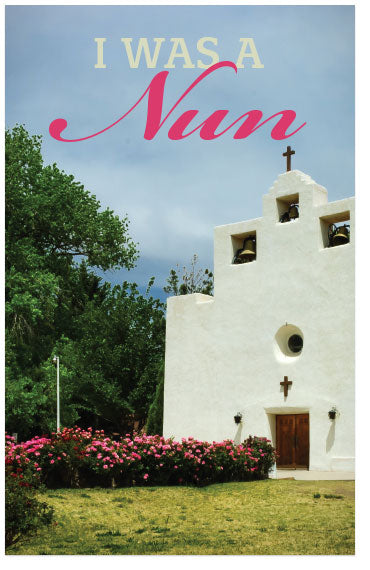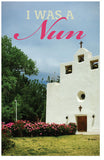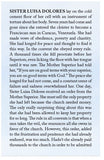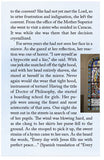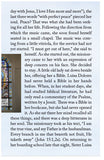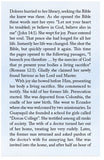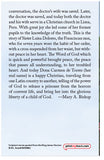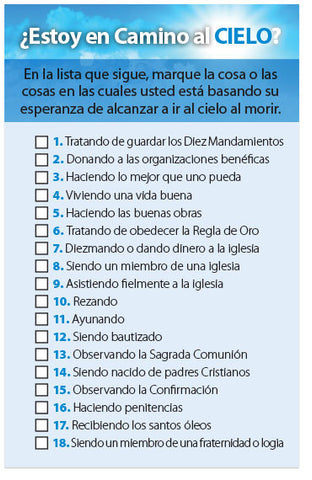I Was A Nun
Special-Order Folded Tract
 NOTE: This item is custom-printed to order (click for more details).
NOTE: This item is custom-printed to order (click for more details).
This tract is from our print-on-demand library, and is not kept in stock. Select the options below, and we will custom-print a batch just for you. Because this item is custom-printed, you can add your custom imprint to the back page at no extra cost.
- Estimated shipping date: Thursday, March 26 (Click for more details)
- SKU:
- Discounts: Discount coupons do not apply to this item
- Format: Folded Tract
- Size: 3.5 inches x 5.5 inches
- Pages: 6
- Imprinting: Available with 5 lines of custom text
- Version: KJV
- Returns: Because this item is custom-printed to order, it cannot be returned.
Show all item details
The full text of this tract is shown below in the KJV version. (Do you want to print this tract in a different version than the one listed? Contact us and let us know what you're looking for—we may be able to create the alternate version for you at no charge.)
Sister Luisa Dolores lay on the cold cement floor of her cell with an instrument of torture about her body. Seven years had come and gone since she entered the cloister to become a Franciscan nun in Caracas, Venezuela. She had made vows of obedience, poverty and chastity. She had longed for peace and thought to find it this way. In the convent she obeyed every rule. A thousand times she fell prostrate before her Superiors, even licking the floor with her tongue until it was raw. The Mother Superior had told her, “If you are on good terms with your superior, you are on good terms with God.” The peace she longed for had not come, and a constant sense of failure and sadness overwhelmed her. One day, Sister Luisa Dolores received an order from the Mother Superior. She must sell the only property she had left because the church needed money. The only really surprising thing about this was that she had been allowed to keep her property for so long. The rule in all convents is that when a nun takes the veil, she renounces all she owns in favor of the church. However, this order, added to the frustration and penitence she had already endured, was too much. Hadn’t she already paid thousands to the church in order to be admitted to the convent? She had not yet met the Lord, so in utter frustration and indignation, she left the convent. From the office of the Mother Superior she went to visit a sister who resided in Caracas. It was while she was there that her decision crystallized.
For seven years she had not seen her face in a mirror. As she gazed at her reflection, her reaction was one of horror. “I saw myself as a hypocrite and a liar,” she said. With one jerk she snatched off the tight hood, and with her head entirely shaven, she stared at herself in the mirror. Never again would she wear that tight hood, instrument of torture! Having the title of Doctor of Philosophy, she started a boarding school for girls. Her pupils were among the finest and most aristocratic of that area. One night she went out in the streets in search of one of her pupils. The wind was blowing hard, and as she clung to her skirts her purse fell to the ground. As she stooped to pick it up, the sweet strains of a hymn came to her ears. As she heard the words, “Every day with Jesus fills me with perfect peace…” (Spanish translation of “Every day with Jesus, I love Him more and more”), the last three words “with perfect peace” pierced her soul. Peace? That was what she had been seeking for all her life. Following the direction from which the music came, she soon found herself seated in a small chapel. The music was coming from a little vitriola, for the service had not yet started. “I must get out of here,” she said to herself. As she started out, the missionary came to her with an expression of deep concern on his face. She decided to stay. A little old lady sat down beside her, offering her a Bible. Luisa Dolores had never held a Bible in her hands before. When, in her student days, she had studied biblical literature, he had only read a commentary of the Psalms, written by a Jesuit. There was a Bible in her bookcase, but she had never opened it. As she sat there her mind recalled all these things, and there was a deep bitterness in her soul. The missionary took as his text, “I am the true vine, and my Father is the husbandman. Every branch in me that beareth not fruit, He taketh away” (John 15:1,2a). On returning to her boarding school late that night, Sister Luisa Dolores hurried to her library, seeking the Bible she knew was there. As she opened the Bible these words met her eyes: “Let not your heart be troubled; ye believe in God, believe also in me” (John 14:1). She wept for joy. Peace entered her soul. That peace she had longed for all her life. Instantly her life was changed. She shut the Bible, but quickly opened it again. This time the pages opened to the following passages, “I beseech you therefore … by the mercies of God that ye present your bodies a living sacrifice” (Romans 12:1). Gladly she claimed her newly found Saviour as her Lord and Master.
With joy she bowed before Him, presenting her body a living sacrifice. She commenced to testify. She told of her former life. Persecution started. She was deported from Colombia, the cradle of her new birth. She went to Ecuador where she was welcomed by two missionaries. In Guayaquil she founded a school for girls called “Dorcas College”. She testified among all ranks of society. The wife of a doctor turned her out of her home, treating her very rudely. Later, the former nun returned and asked pardon of the doctor’s wife for annoying her. She was invited into the home, and after half an hour of conversation, the doctor’s wife was saved. Later, the doctor was saved, and today both the doctor and his wife serve in a Christian church in Lima, Peru. With great joy she led some of her former pupils to the knowledge of the truth. This is the story of Sister Luisa Dolores, the Franciscan nun, who for seven years wore the habit of her order, with a cross suspended from her waist, but without peace in her heart. The Word of God which is quick and powerful brought peace, the peace that passes all understanding, to her troubled heart. And today Dona Carmen de Torres (her real name) is a happy Christian, traveling from one Latin country to another, telling of the power of God to release a prisoner from the horrors of convent life, and bring her into the glorious liberty of a child of God. —Mary A. Bishop

